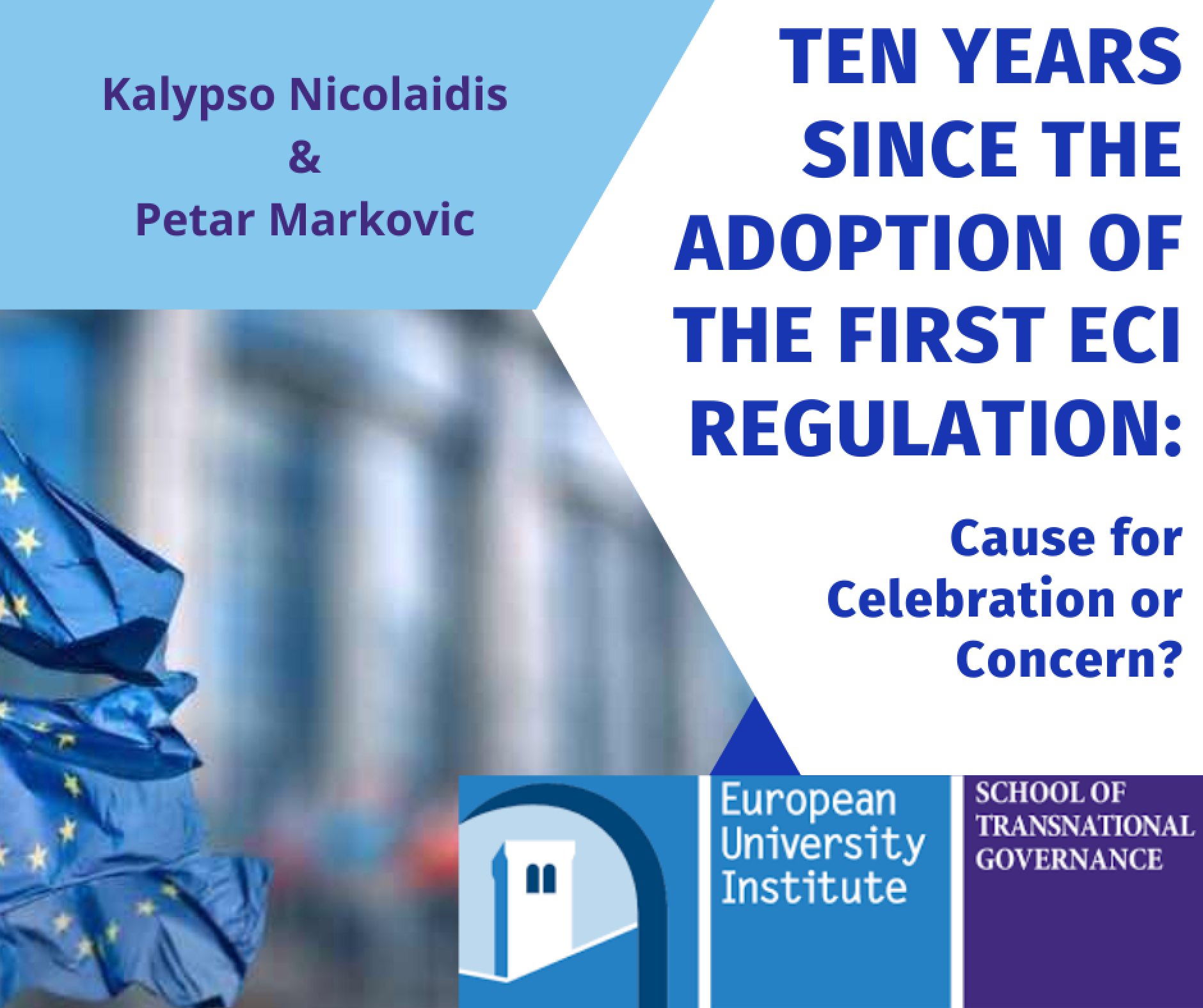European citizens and organised civil society have so far played the central role in making the European Citizens' Initiative (ECI) fit for purpose; now the European institutions need to join them and step up their game.
As the European Citizens’ Initiative Regulation turns ten, we take a closer look at this transnational instrument which promised to bring to the fore issues that citizens care about but have been ignored by Europe's political class. We find that this has been quite a chastened ambition for the Union’s unique democratic enfant terrible. How then can we start with what we have and better fulfil the ECI’s promise from a decade ago?
It ought to be a matter of great pride that the first transnational tool of participatory democracy in the world was created by the European Union ten years ago. Conceived during the constitutional convention of 2001-03, enshrined in the Lisbon Treaty in 2007, the European Citizens’ Initiative was given its legal framework to become operational ten years ago, which allowed the first actual ECIs to be launched one year later, in 2012. Upon this 10th birthday of the Regulation, do we have cause for celebration or concern?
A lot can happen in a decade. European integration is full of examples of auspicious decennial anniversaries. In 1960 the European Communities celebrated 10 years of the Schuman Declaration. In the course of the past ten years, the European Coal and Steel Community Treaty, the Treaty of Rome and the Euratom Treaty had been signed. The latter’s 10th anniversary was in turn marked by major developments including the merging of the institutions founded by these three Treaties into a single set of EU bodies we know today. What, however, can we make of the first decade of the European citizens’ initiative?
To this day, 101 ECIs have requested registration since 2011, almost one per month on average. This is an impressive testimony of the vivacity of European civil society by all accounts. But from there, the numbers go down: 76 were registered, 6 managed to collect the required one million signatures in at least seven member states, or 7 if one counts, as we do, the STOP TTIP self-organised ECI which was later vindicated by the Court of Justice of the EU.
Most importantly, however, from the 7 initiatives which made it to the goal post, one would expect more legislative success stories. One of the few follow up activities by the European Commission was based on the Right2Water initiative. It resulted in the revision of the Drinking Water Directive that entered into force at the beginning of this year, as a watered-down (no pun intended) response, a staggering 9 years after the first ever successful ECI was launched. It seems that it is easier for the proverbial camel to go through the eye of a needle than for a launched ECI to be transformed into law.
Why such an underwhelming childhood from such a promising birth? And where should we go from here?
What’s in a name?
We need to go back to the ECI birth itself which ten years ago was almost ubiquitously welcomed, as most believed that this was an instrument without precedent with a formidable potential impact on the democratic life of the Union. Yet, there were cracks from the outset in this apparent consensus, reflecting very different views about the desired nature of democracy and citizen participation in the EU. From then onwards, the ECI was to serve the EU’s democratic Rorschach test – a transnational democratic innovation with an ambiguous enough design to allow for different readings by different stakeholders. In short, the most ambitious reading uses the lens of direct democracy which usually encapsulates consultative or binding bottom-up mechanisms for the direct expression of citizens’ preferences such as legislative initiatives and referenda. Participative democracy is a wider notion popularised by republican theory encompassing various ways of realising the ideal of active citizenship, for the sake of the individuals or groups involved as much as for the society as a whole. Finally, deliberative democracy is what it says on the tin, an understanding of democracy as a forum for political debate that might hopefully help to forge some sort of consensus, by enabling citizens possibly to change their preferences through collective public reasoning.
Each of these understandings of democracy leads to a different idea of the purpose, scope and potential of ECIs. Drawing analogies with similarly named popular initiatives at the national level, the ECI was initially hailed as the “first transnational instrument of direct democracy”. At the other end of the spectrum, the European Commission has been more than happy to surf on the inherent ambiguity of ECIs to emphasise mere transnational deliberation rather than citizens’ decision-making. In this latter sense ECIs could serve as a silver bullet to address the citizens’ apathy or at least indifference to European affairs. For example, when pressed in 2010 by the media about the danger that the ECI might fail to bridge the democratic gap between Brussels and citizens its Vice-President at the time Maroš Šefčovič disagreed “not only because it provides a direct gateway for citizens to make their voices heard in Brussels but also because it will foster a real cross-border debate about EU issues.”
The expectation gap between those in civil society pinning their hope on more direct democracy and a Commission that feared that its insulated decision-making culture would be overwhelmed was only partially resolved after the long-awaited adoption of the new and much more user-friendly ECI Regulation 2.0 which became applicable in 2020. On the face of it, we seem to have reached a common understanding that the ECI in its current form is nothing more nor less than a transnational agenda-setting tool. As such, and very occasionally, an ECI can generate transnational debates and bring to the fore novel issues that citizens care about and that have been ignored by the political class. This is quite a chastened ambition for the Union’s unique enfant terrible. How then can we start with what we have and better fulfil the ECI’s promise?
How not to throw the baby out with the bathwater?
Many avenues have been proposed by the growing literature on the subject, but most importantly, what can be done without Treaty change? For one, there is a need to address the oddity that when it comes to ECIs, the Commission stands both as judge and jury, with the competence both to decide on their admissibility and their follow up and their ultimate fate. We believe that this process of assessment, while remaining in the hands of the Commission, needs to be opened up to the other two institutional actors, namely the Council and the Parliament. But beyond institutional reform, it is the very democratic ethos of these institutions that is at stake. Not only formal rules but shared democratic ethos or mindsets inform our day-to-day praxis.
Let us rejoice for a moment then in the thought that every petition to launch ECI takes up the banner of a cause that many citizens find important enough to become involved in the arduous task of transnational politics and organising – be it the fight for our climate, unconditional basic income in Europe, full political rights of EU citizens or fair global access to vaccines, ECI campaigns are not just debating clubs across borders. Through the hard work of its organisers and supporters, each ECI generates an invaluable new transnational network, heterogeneous coalitions of dedicated Europeans who choose to amplify their voice both horizontally, by Europeanising their respective national public spheres, and vertically, by putting pressure on EU institutions. However, research has shown that without conscious institutional support the vast majority of such campaigning energies evaporate upon their official conclusion. Once a forceful current, the typical ECI campaign leaves a dry riverbed behind. Only a few solidify their legacy into a permanent source of bottom-up and cross border political participation.
In view of such ‘democratic waste’ we believe that it would be fitting for the Commission to implement innovative ways of keeping alive the rich bounty of human capital generated by ECIs. Would this not be fitting for a body that is supposed to be the guardian of the Treaties? This would not be such a tall order – after all, ECI organisers will have already cast their net, so the EC mandarins will only need help collect the catch. If the EU is to implement a genuine approach to sustainable integration, it will need to better embrace processes that are durable, resilient and politically endorsed across generations. Beyond keeping precious networks of participation and democratic forces vives alive, such an approach would help support EU rights and the rule of law through sustained participation, and a sense of ownership by ever more citizens from Europe – and hopefully beyond - that the Union belongs to them too.
A child no more
Up to now, and perhaps unsurprisingly, it is European citizens and organised civil society that have played the central role in making the ECI fit for purpose. Wherever they come from, they need to continue speaking truth to power. But European institutions at this stage need to join them in this great democratic adventure and step up their game. At the beginning of her mandate, the EC President Ursula von der Leyen committed to “responding with a legislative act” whenever the European Parliament “adopts resolutions requesting that the Commission submit legislative proposals” (A Union that Strives for More). Aware of this new commitment, the European Parliament could test it by exercising its right to adopt not only nonbinding resolutions endorsing successful ECIs - as it most recently did with Minority SafePack, but by making use of its right of initiative and tabling resolutions under Article 225 of the Treaty on the Functioning of the European Union (TFEU). This course of action would give teeth to the institutions' pledge for more EU citizens' participation in European policy making. Imagine: a chain reaction leading from citizens, through the EP and the Commission, towards a new EU law. Transnational democracy starts with holding those in power true to their own words.
Disclaimer: The opinions expressed on the ECI Forum reflect solely the point of view of their authors and can in no way be taken to reflect the position of the European Commission or of the European Union.
Contributors
Kalypso Nicolaidis, Petar MarkovicKalypso Nicolaidis is professorial Chair in Transnational Governance at the EUI School of Transnational Governance in Florence. She is currently on leave from the University of Oxford where she has been professor of International Relations and a governing body fellow at St Antony’s College at the European Studies Centre since 1999. Previously professor at Harvard University’s Kennedy School of Government and at ENA, she has worked with numerous EU institutions, including as a member of the European Council’s reflection group on the future of Europe chaired by Felipe González (2008-10), and is an ECFR Council member. Her research interests revolve around internal and external aspects of European integration as well as global affairs, theaters of recognition, demoicratic theory, solidarity and empathy, global governance and international trade, sustainable integration, post-colonialism, myth and politics and the import of new technologies on international relations. Her latest books are ‘Exodus, Reckoning, Sacrifice: Three Meanings of Brexit’ (Unbound, 2019), 'The Greco-German Affair in the Euro Crisis: Mutual Recognition Lost?', (co-authored with Sternberg and Gartzou-Katsouyanni, Palgrave, 2018) and 'Echoes of Empire: Memory, Identity and Colonial Legacies' (edited with Sebe, I.B. Taurus, 2015). More information can be found on her website: http://kalypsonicolaidis.com/
Petar Markovic is currently a Policy Leader Fellow at the School of Transnational Governance of the European University Institute in Florence, Italy. Before winning this fellowship, he was the Citizens’ Rights Training Coordinator at the European Citizen Action Service (ECAS). Until 2020, he was the director of the ECIT Foundation. In both these Brussels-based civil society organisations, he has been devoted to the research, advocacy and promotion of European citizenship. Petar holds a double PhD in political theory and political science from the Université Libre de Bruxelles (ULB) in Belgium and LUISS in Rome with research stays at the University of Oxford. He now puts his knowledge on transnational democratic innovations such as the ECI into practice by advocating for citizen-led politics beyond the nation state. In 2019, he was in charge of the training and political impact activities of Transeuropa Caravans, a transnational project that saw 25 young activists cross 15 EU countries in search for partnerships and best practices of innovative transnational political participation. Petar is also a collaborator at ULB Institut d'études européennes and teaches EU Politics and International Relations History at Vesalius College. Beyond the EU, his research interests include the democratization of the Western Balkans.
Connect with them on the Forum!





Leave a comment
To be able to add comments, you need to authenticate or register.Comments